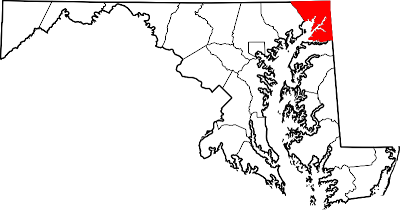"Corner Counties" in Politics
Geography can turn a small problem of political apathy into a big one in a hurry. Rural voters in the "corner counties" of America often stay at home on Election Day for good reason. When you're living in Jay or Century or Baker in Florida, or North East or Port Deposit or Colora in Maryland, you're probably on the outside looking when it comes to political inclusion.
It matters come lobby day, when you've gotta schlep across the whole state to get to the state capitol. It matters on the campaign trail of statewide races--attorney general, governor, U.S. Senate--when none of the candidates bother to visit your town or even your county. It matters on Election Day when nobody has campaign signs to show their pride, or literature from the candidates, or a single article in the hometown paper taking note of the race. If the candidates don't show up, why should you? Most important, it matters after Election Day, when state services take more time to make it to the corners, and when they get there they're received with a double dose of cynicism and frustration.
Let's compare two "corner counties"--Cecil County, Maryland and Escambia County, Florida--and see what puts them on the outside. Cecil County has the unique geographical curse of being miles and miles from the state capitol in Annapolis, but very close to two large metro areas and political centers--Philadelphia, PA and Wilmington, DE. A lot of folks in Cecil County just got there from Philly or Wilmington, and they've brought their sports and political allegiances with them--Maryland be damned. They're Eagles fans, Philly politics junkies, and union workers in Delaware. And when you throw a lit piece for a Maryland campaign in front of them, they're more likely to use it as a coaster for their Miller Lite than read it and care about it. They don't vote in Maryland or follow Maryland politics or even identify as Marylanders--they just live there. Cecil County today for many is a political no man's land, and as thousands more people move there to buy up in the woods near the Chesapeake Bay and relax before their hour commute to Pennsylvania or Delaware, the bigger the problem for Maryland state government.
Cecil County has the unique geographical curse of being miles and miles from the state capitol in Annapolis, but very close to two large metro areas and political centers--Philadelphia, PA and Wilmington, DE. A lot of folks in Cecil County just got there from Philly or Wilmington, and they've brought their sports and political allegiances with them--Maryland be damned. They're Eagles fans, Philly politics junkies, and union workers in Delaware. And when you throw a lit piece for a Maryland campaign in front of them, they're more likely to use it as a coaster for their Miller Lite than read it and care about it. They don't vote in Maryland or follow Maryland politics or even identify as Marylanders--they just live there. Cecil County today for many is a political no man's land, and as thousands more people move there to buy up in the woods near the Chesapeake Bay and relax before their hour commute to Pennsylvania or Delaware, the bigger the problem for Maryland state government. Escambia County's problem is worse in some ways and better in others. It's far away from Tallahassee--200 miles to be exact--but isn't drawn to any political poles as strong as Philadelphia or Wilmington. It's close to Mobile, Alabama, but equally close to Pensacola, Florida. So I suspect folks in Century feel Floridian, but they probably don't feel connected to Florida politics. Why should any candidate for Florida governor, U.S. senator, or attorney general come there? The Panhandle is deep red; why bother if you're Democrat or Republican? And it's sparsely populated compared to the boomburbs of South and Central Florida. I suspect the last statewide candidate to campaign hard out there was Lawton Chiles.
Escambia County's problem is worse in some ways and better in others. It's far away from Tallahassee--200 miles to be exact--but isn't drawn to any political poles as strong as Philadelphia or Wilmington. It's close to Mobile, Alabama, but equally close to Pensacola, Florida. So I suspect folks in Century feel Floridian, but they probably don't feel connected to Florida politics. Why should any candidate for Florida governor, U.S. senator, or attorney general come there? The Panhandle is deep red; why bother if you're Democrat or Republican? And it's sparsely populated compared to the boomburbs of South and Central Florida. I suspect the last statewide candidate to campaign hard out there was Lawton Chiles.
When state candidates ultimately do go to the corners, embracing either a 24-county strategy in Maryland or a 67-county strategy in Florida, apathy and cynicism abound. For every election year that they're ignored, it takes a half dozen election cycles to build back the trust and the inclusion. But as Chiles showed, once you make that genuine connection to the folks in Escambia County, they're yours forever. Howard Dean's 50-state strategy has brought this spirit of inclusion to the national Democratic Party.
Thankfully, on a presidential level, some candidates are hitting the rural trail, corners included. John Edwards just released his plan for revitalization in the South Carolina countryside. If you're not president for all the counties--from the heartland to the hinterland--you're not doing the job.

No comments:
Post a Comment